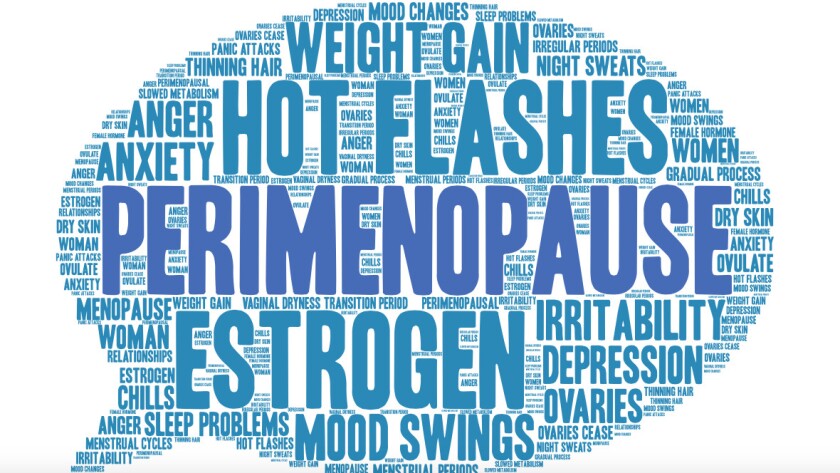Susan Davidson thought she lost her mind when she started screaming at her kids when they horsed around in the store. She would swing from angel to Wicked Witch at the drop of a hat — and she couldn’t figure out why.
But then the night sweats hit so bad she looked like she had just stepped out of the shower even though she was in bed. And it hit her: Menopause. No way, Davidson thought. She was only 44. She was too young for that, right?
Kind of. What Davidson was experiencing, she now knows, was perimenopause, the time when women are transitioning into menopause.
“Nobody tells you this is going to happen,” Davidson, who at 51 finally did hit menopause. “I wish I would have known or had some guidance so I would have been better prepared to handle it.”
To understand perimenopause, it’s easier to understand menopause first. Doctors define menopause as the time when a woman stops having a period for 12 consecutive months, and for most women in the United States, that happens at age 51. Perimenopause, then, is the time leading up to that, when a woman’s estrogen and progesterone fluctuate. It can start as far back as 10 years before menopause hits, said Monica Christmas, director of the University of Chicago Medicine’s menopause center, but most women enter perimenopause in their 40s.
The hormonal rollercoaster during that time can cause menopause-like symptoms, which can be confusing to women who still get their periods.
“The timing blindsides people,” said Lauren Streicher, who founded the Northwestern Medicine’s Center for Sexual Medicine and Menopause in Chicago. “At this age, women are often peaking in terms of their professions, and suddenly, their body isn’t functioning — they’re not sleeping, they’re not thinking clearly.”
But they’re getting their cycles, so they often wonder if it’s all in their heads. It’s not, both she and Christmas said. The lucky ones are symptom-free. But many women feel like they have severe PMS, Christmas added — breast tenderness, acne and irritability, like the anger surges Davidson had. Others also have low sex drive, vaginal dryness, brain fog, fatigue and sleeping problems. The classic signals? Hot flashes and night sweats.
Those hit Amy Cuevas Schroeder of Chicago when she was 40.
“I was like, ‘What the heck is this?’” said Cuevas, who is now 43 and blogs about her perimenopause experience. “I started Googling like crazy trying to guess what was going on. Somehow I came across “perimenopause” and I was like, ‘Oh, that’s what this is.’”
Symptoms, for the most part, are what doctors rely on to diagnose perimenopause. There are no reliable tests to determine whether a woman is in that transitional stage and there are none that can predict menopause.
“I think everybody thinks there is a definite number: ‘Is my hormone level supposed to be XYZ? Draw my blood and tell me what my hormone level is and what I can do about it,’ ” Christmas said. “But that’s a misconception. ‘Normal’ varies so significantly that they make the idea of hormone level not relevant to menopause.”
Those over-the-counter tests that purport to measure hormone levels in blood and saliva you hear about, she added, are a waste of money.
But the good news is that women do not have to suffer and do not have to suffer alone.
“A lot of times women will go to the doctor and the doctor will say, ‘Well, this is a normal part of aging.’ And the woman will say, ‘Is that all there is?’ No, it’s not,” Streicher said.
Women should try to see a menopause specialist, one certified by the North American Menopause Society, she said. From there, there are many prescription and non-prescription options.
Christmas said that women who experience mood swings, anger and irritability often find relief by using low-dose antidepressants. Hot flashes, cramps, irregular periods, vaginal dryness and other symptoms can be treated with hormones. Hormonal treatments, Streicher said, come in many forms: pills, patches, creams, sprays and gels.
“We load them up on information and say, ‘What would you like to do?’ ”
Sometimes talk therapy goes a long way in helping with the stress and anxiety related to aging, Christmas said.
She also stressed that living a healthy lifestyle can’t be underestimated. Good nutrition and exercise go a long way in preventing diseases such as diabetes that can complicate the symptoms of perimenopause. Activity can help alleviate depression. Weight-bearing activity prevents bone loss and increases muscle mass. For women who feel less attractive or less sexy when they gain weight, that muscle mass is important, Christmas said, because it increases metabolism.
“In your 40s and beyond, there’s no bouncing back without a real, concerted effort,” she said.
One of the best things women can do, she and Streicher stressed, is to talk about what they’re experiencing not only with doctors, but with family and friends, too. There’s no shame in getting older, and the more information a woman has, the better her quality of life will be.
Cuevas Schroeder agreed.
“I am embarrassed,” she said. “But I know we need to do something and that is why I worked up the confidence to talk about it. I’m just getting started on my journey.”
Erika Hobbs is a freelance writer.







